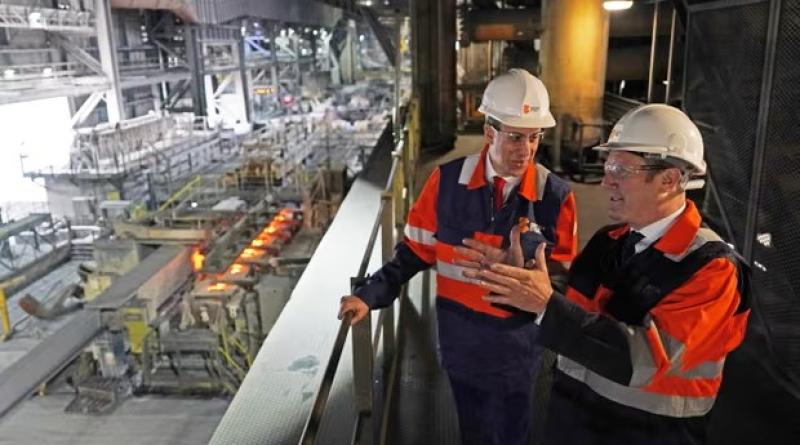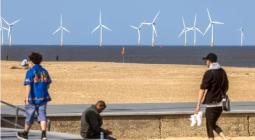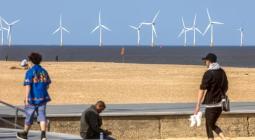Labour to stand firm on net zero policies and attack cost of Tory retreat

Party will argue green growth is route to lower bills and says Rishi Sunak will leave UK stuck in economic ‘doom loop’
Labour will “double down” on making the case that tackling the cost of living crisis and the climate crisis can only be done in tandem, despite an intensifying Conservative attack on net zero policies, the Guardian has learned.
Labour will argue that seeking green growth is the way to bring down household bills and secure the future of the UK economy.
The party believes that Rishi Sunak’s dramatic U-turns last week on key net zero policies reveals a weakness in his strategy, in a lack of vision for future economic growth, and by adding to the cost of living for people on low incomes.
Ed Miliband, shadow secretary of state for energy security and net zero, told the Guardian: “Rishi Sunak is a man bankrupt of ideas who has shown this week he neither has answers to the cost of living crisis nor the climate crisis. His announcements will put up costs for working people, threaten investment and jobs, and lead to climate delay, loading more costs on to families.”
Some commentators have predicted that Labour would weaken its own stance in response. Miliband made clear the opposite was true.
“We relish the fight ahead on the question of who can really stand up for working people,” he said. “Labour’s plan will cut bills, create jobs, deliver energy security and tackle the climate crisis, while Rishi Sunak will leave Britain stuck in a doom loop of a permanent cost of living crisis and economic stagnation.”
Thinktanks and analysts have found that the impacts of the Tory reversals of key policies will be felt by people on lower incomes. The scrapping of a proposal to force private landlords to improve the insulation and energy efficiency of their rental properties will cost renters at least £1bn more a year in high heating bills and wasted energy, according to the Social Market Foundation.
The delay to the ban on petrol and diesel vehicles also carries a potential cost, as electric vehicles can save their owners thousands of pounds over their lifetimes. Sunak also weakened the proposed ban on new gas boilers from 2035, which will keep people hooked on expensive gas for longer, even as the cost of heat pumps is falling rapidly.
At the weekend, the BBC revealed that the government had closed down the energy efficiency taskforce, a group set up in March to help people gain access to insulation and more efficient heating.
Miliband said: “Every family is paying the price in higher energy bills, due to 13 years of Tory failure on insulating homes. After Sunak’s track record as chancellor with the disastrous green homes grant, this is another shortsighted decision that will cost families money.”
Emails from the Conservative party to journalists last week also revealed a Tory attack on Labour’s pledge of £28bn investment in a low-carbon economy.
But leading economists have argued for years that investing in low-carbon activities will be crucial for developed economies, as there are no viable alternatives for future growth.
Lord Stern, the cross-bench peer and professor at the London School of Economics, said in an interview: “Green growth is the economic growth story for the coming two to three decades. Clean is already cheaper than dirty across many parts of the economy, in energy, and increasingly in electric vehicles. Within seven years, we estimate that in 70% [of the global economy] clean will be cheaper than dirty.”
He said most of the innovation in modern economies was pouring into clean technology. “This is where we see investment going, and the pace of change is surprisingly fast.”
He warned that the UK risked missing out. “If you chop and change, you damage the confidence of investors and innovators. You reduce their trust,” he said.
There were also health benefits to the shift to a low-carbon world, Stern added. “We kill 35,000 people a year through dirty air, much of which comes from burning fossil fuels, and we maim many more. That is not only affects people’s lives, but reduces economic productivity.”
Political experts said Labour was right to emphasise green growth, and not follow the Tories into a “culture war” on the climate.
Tom Burke, a veteran government adviser and co-founder of the green thinktank E3G, warned Labour not to respond by weakening its own policies. “They should not fall for this trick,” he said. “Don’t look at the headlines in Tory newspapers [welcoming the prime minister’s U-turns], they do not reflect what Tory voters want. Labour should step up and show they have a positive story of investment.”
Shaun Spiers, executive director of the Green Alliance thinktank, said: “If Labour lose their nerve, they will look weak, like flip-floppers. They should make the case that energy efficiency, electric vehicles, low-carbon energy will all save people money and attract investment.”
A spokesperson for the Department for Energy Security and Net Zero said: “We have invested £6.6bn in energy efficiency upgrades this parliament, and will continue to support families in making their homes more efficient, helping them to cut bills while also achieving net zero in a pragmatic, proportionate and realistic way.”
Photograph: Ian Forsyth/Getty Images - Keir Starmer and Ed Miliband at a British Steel plant in north Lincolnshire, where they reiterated Labour would invest in a new era of ‘green’ steel.





